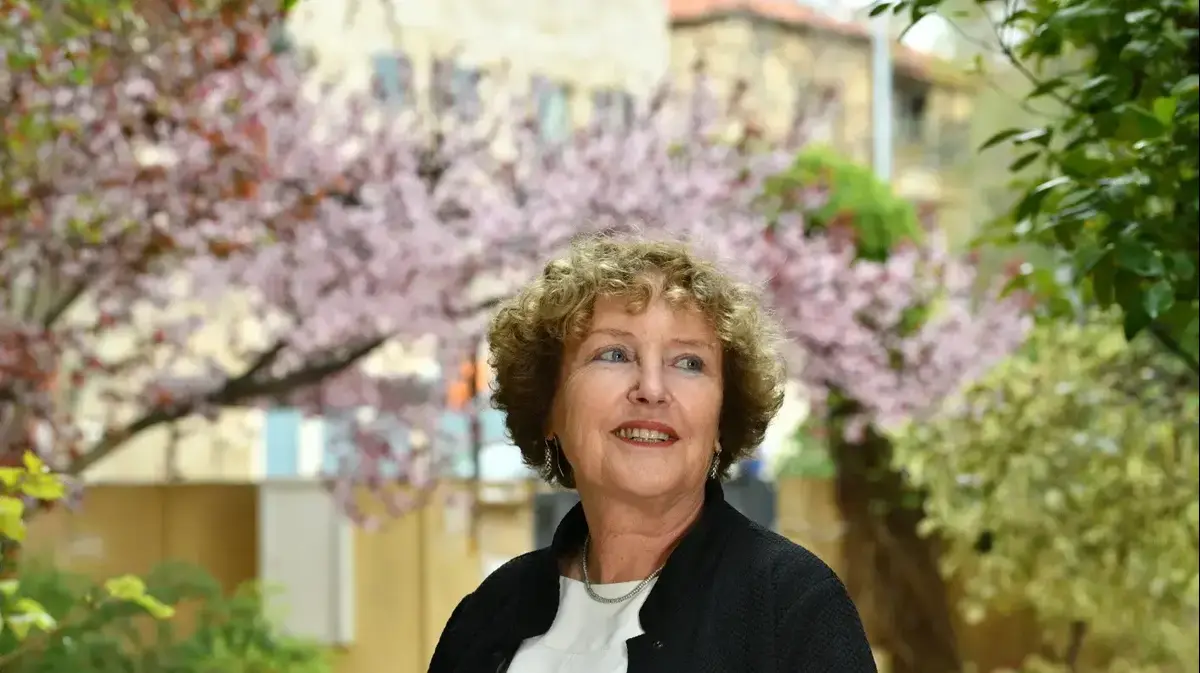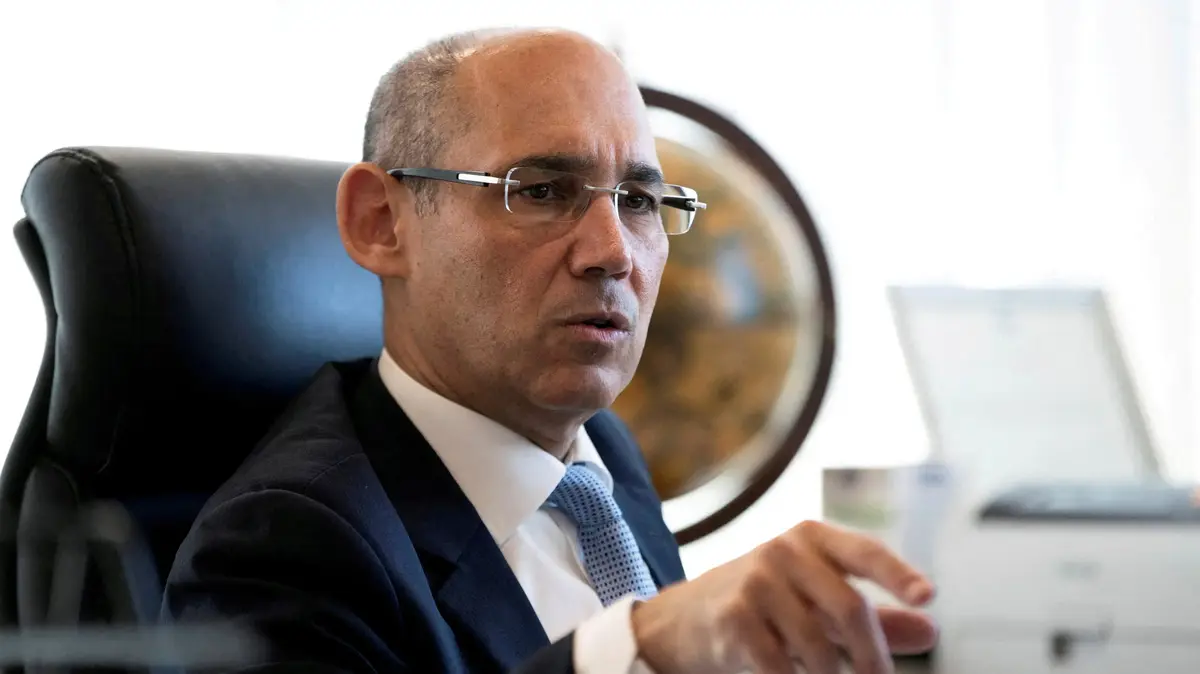"If the war and inflation were in the hands of the politicians, as it was in the past, the situation would be catastrophic" (Photo: Reuven Castro)
When Stanley Fischer retired from his position as Governor of the Bank of Israel, he started a tradition of celebratory farewell conferences attended by senior economists, instead of a standard cocktail party.
Five years later, the Bank of Israel parted ways with Karnit Flug, who was his deputy and replaced him in the position, at a conference with many participants at the Van Leer Institute, in the presence of the former governors: Fischer himself, Prof. Jacob Frankel, and the deputy governor Prof. Zvi Eckstein.
The speech given by Flug sounded too radical at the time, but today it is very relevant, as if she predicted what is happening now in the State of Israel, when the politicians are trying to interfere in the activities of the central bank.
"Regarding the friction between the central bank and the political system," Flug said at the time, "during my tenure the tension increased precisely around issues that are at the core of the Bank of Israel's activities, which relate to supporting financial stability. The drive to increase competition in financial services, which we all share, led to a lively debate about the pace , the scope, and the specific details of the reforms in the financial sector. The debate focused on our insistence on ensuring that the reform does not undermine financial stability, which is sometimes taken for granted by our partners in designing the reform."
"We must be able to withstand them," she added.
"In some situations, we must provide the policy recommendations quietly, behind closed doors, and in the main policy questions we must also contribute to a more informed public debate. I believe that in the current political context where policy tends, more than in the past, to focus on short-term benefits and ignore long-term risks and costs , it is essential that an independent institution with a reputation provide policy analysis and advice, and assist in explaining the issues to the public."
"I am disturbed and surprised by Gafni's legislative initiative, which talks about not rolling over the interest rate increase on some mortgages" (Photo: Reuven Castro)
obvious and immediate danger
It has been five years since she left the public service.
Today, she serves as the vice president for research at the Israel Democracy Institute and a lecturer at Tel Aviv University, and the bill by the chairman of the finance committee, Moshe Gafni, to freeze interest on mortgages, which has been postponed for the time being, is still hanging in the air.
When I remind her of that speech, at the conference, she smiles sadly.
"I still think that the danger of harming the independence of the Bank of Israel is a real danger," says Flug.
"If you had asked me a year or two ago, if someone would really threaten the independence of the Bank of Israel, I would have said that it was unthinkable, but I learned recently that even things that should not occur to me, occur to others, such as the statements of government officials On the possibility of Bank of Israel policy intervention.
"I am disturbed and surprised by Gafni's legislative initiative, which talks about not implementing the interest rate increase on some mortgages.
This is not only an intervention in the independence of the Bank of Israel, but the neutralization of the capacity of its policy instruments,
I'm glad that the Prime Minister stopped her, but the fact that she came up at all is amazing.
This can degenerate into an inability to fight inflation.
It is not for nothing that central banks have been given the independence to fight inflation using the tools at their disposal.
If the inflation war was in the hands of the politicians, as it was in the past, the situation would be catastrophic.
"We saw what happened in Israel in the 1980s and what happened in Turkey, when Erdogan fired a series of governors he didn't like, told the governor, who was his man, that the way to fight inflation was to lower interest rates and brought the Turkish economy into a serious crisis. It's not for nothing that the handling of inflation is in my hands Professionals".
More in Walla!
10 weeks and swim half an hour rowing easily!
TI undertake!
Served on behalf of TI SWIM
"We saw what happened in Israel in the 1980s and what happened in Turkey, when Erdogan fired a series of governors he didn't like" (Photo: Reuven Castro)
The coming year is a critical year for the Bank of Israel.
The markets are turbulent, inflation is rampant, the politicians are trying to undermine his independence, and in addition, Prof. Amir Yaron, the current governor, is supposed to finish his position at the end of this year, and a new supervisor of banks is supposed to be appointed soon.
In your farewell speech, you gently touched on the attacks you had and recommended doing the moves quietly in private rooms.
Prof. Amir Yaron, caught fire from the politicians and became a punching bag when he raised the interest rate.
It is not easy to withstand these attacks and keep calm.
"Anyone who holds a state and non-political position does not participate in the discourse led by politicians to personal places. I often thought that I was conducting the discourse with both hands tied behind my back, because I did not think it was right to descend to the personal level."
"Many times I thought I was leading the conversation with two hands tied behind my back" (Photo: Reuven Castro)
point of no return
Prof. Flug, 68, holds a doctorate in economics from Columbia University in New York, was an economist at the International Monetary Fund, a senior research economist at the Inter-American Development Bank, director of the Bank of Israel's research department and a member of the board.
After two years as deputy governor Stanley Fisher, she was appointed the first female governor of the Bank of Israel, and was twice chosen among the seven best governors in the world by "Global Finance" magazine.
During her tenure, she had difficult frictions with the Minister of Finance at the time, Moshe Kahlon, on a variety of issues, including the transfer of a two-year budget and the "Price for the Resident" program, which she criticized in an elegant manner.
Quietly, in a reasoned way, without ricochets.
She also articulates her opposition to the legal reform with moderate clarity, although she is very worried about the economic damage.
We met after the credit rating company Moody's released its disturbing report.
"Moudis issued an unofficial report that warned against the short- and long-term consequences of the legal reform," she says.
"According to him, if the move is fully implemented, these changes will weaken the ability of legal control over the government. He goes on to say that the changes endanger the long-term economic horizon and the foreign investments that are critical to tech. What the report says is very similar to what economists have been warning against since the legal revolution went out into the world.
"A lot of people, who are not necessarily politically identified and understand a thing or two about the economy, stood up and raised the alarm. They understand, but I don't understand, how can it be that the heavy price of this move, both financially and in terms of the rift in the nation, has not yet caused the reform to stop. I hope they come to their senses and stop the move and they will try to formulate a measured reform that will be formulated with a broad consensus."
What are you most upset about?
"I fear that if the move goes through as formulated by those who lead it, it will weaken the judicial system and turn the government into an unbridled force, will result in damage to the economy, property rights, contractual rights and protection of players and investors against arbitrary decisions by the government and a unilateral change of the rules of the game in a change of government. This will make entrepreneurs and investors shy away from being here."
Are you afraid of "running to the bank" and withdrawing hysterical deposits?
"I fear less for the financial stability of the banks and more for the potential damage to the economy in the medium and long term. The main channel that will be affected is that of investors. Already today, the availability of capital investments is lower, due to the rise in interest rates and fluctuations in the capital market. Capital is becoming more selective. Our high-tech sector depends on funding a foreigner. They will be less able to develop their ideas. Because his weight in the Israeli economy is high, 15% in GDP, 25% of direct tax receipts and 10% in employment,
This is why the hi-techists were the first to protest.
"We should have jumped in, not them. High-tech entrepreneurs are bright and mobile. There are many countries in the world that would be happy to welcome them. It's not just high-tech, but investments in general. Investors from abroad look at environmental, social and corporate governance considerations.
"The meaning, because of the weight of high-tech, will be damage to the economy, employment and tax revenues, which will oblige the government to reduce its expenses, reduce investment in infrastructure and provide fewer services to the citizen. This will harm all citizens of the country, but first of all the weak population. And we did not discuss what would happen if there was a reduction Credit rating. Then our financing cost will increase and we will pay interest on the debt. We are not yet at the point of no return, but we are getting closer to it by giant steps."
"We should have jumped, not them. High-tech entrepreneurs are brilliant and mobile. There are many countries in the world that would be happy to receive them" (Photo: Reuven Castro)
does not raise hands
You are talking about future harm - but it is already here, we all feel the price increases in the supermarket, which is carried out under the radar, under the auspices of legal reform.
"It may be that the public attention makes it easier to raise prices. We see great volatility in the exchange rate and how sensitive it is to the legislative process. When the impression is created that it is rushing forward, devaluation occurs, and when there is talk of a compromise - the shekel strengthens. But if the process we are in the middle of comes to fruition, there will
be A significant decrease in the flow of capital to Israel and perhaps Israeli exports will also suffer, we will face a process of devaluation that will feed inflation. A large part of the raw materials and products originate from imports and therefore this affects the prices. According to the Bank of Israel's estimates, each devaluation of one percent increases inflation by 0.2 %".
In September, a study you conducted was published in the media, under the title that life in Israel has become significantly cheaper compared to the past, and I thought to myself, are we living in parallel universes.
After all, the price graph is always face up.
"Unfortunately, the title given to the interview did not reflect the research. The research looked at what happened in the last decade to total cumulative inflation, real wages and disposable income.
Wages rose in real terms by 25% and this coincides with a significant increase in private consumption.
I didn't say that life here is cheap.
Inflation looks at the basket of products and services that households purchase, and it does not include the apartment prices that affect the mortgage burden, which have a lot of weight in the economic situation of households."
"As far as the cost of living is concerned, the competition in the food market is very significant and I would like to hope that the reform on food importers, which came out of the Arrangements Law, will return to it. On the subject of housing, a sufficiently large supply must be ensured on an ongoing basis, also in the areas of demand, so that it meets the need for apartments and apartments for rent In the long term, they have not been promoted enough. This challenge is greater in Israel than in other countries, because the population is growing at a rate of 1.8% per year and there is not enough supply."
"Competition in the food market is very significant and I would like to hope that the reform on food importers, which came out of the Arrangements Law, will return to it" (Photo: Reuven Castro)
When I ask her if she misses the Bank of Israel, Flug says that she loves it very much, but really enjoys her work at the Democracy Institute, which allows her to engage in research.
She is currently focusing on Bindurit leadership in the Israeli economy, the first part of which examined whether the place you come from dictates the place you can reach when you graduate.
A few weeks ago, she published a joint article with Prof. Jacob Frankel, who warned against the consequences of the legal reform.
"We don't have the luxury of raising our hands. As long as it is possible to convince that she should be stopped, I will do so."
And if, in the end, she passes?
"I'm not going anywhere. I'm rooted here."
"I'm not going anywhere, I'm rooted here" (Photo: Reuven Castro)
The interview that Liat Ron had with Prof. Karnit Flug will also be published in Maariv's business supplement, Friday, March 17
Of money
news
Tags
Corneal phlegm
Jacob Frankel
Amir Yaron
Bank of Israel Governor
Bank of Israel
Erdogan














